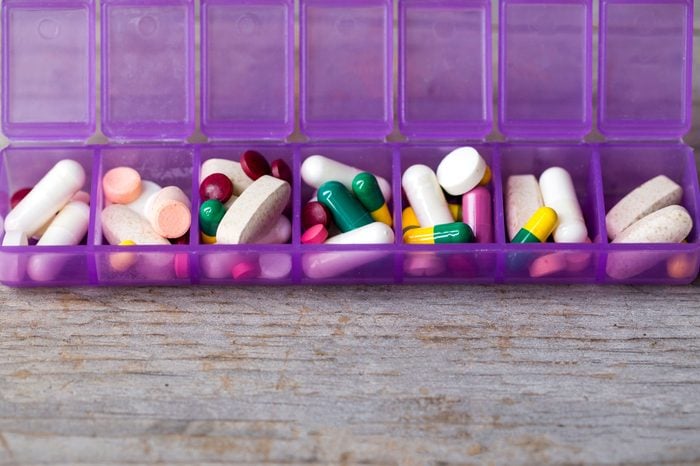
Protecting your baby
If you are a parent, there is nothing you wouldn’t do to make sure your child is healthy and happy, and this care starts even before conception. One in every 33 babies will be born with a birth defect, reports the Centers for Disease and Control and Prevention (CDC). Most birth defects occur during the first three months of pregnancy, though some can happen later in gestation. While the cause of some birth defects is unknown, others have been clearly linked to a cause. These steps can offer you and your baby protection.

Take a multivitamin with folic acid
If you’re trying to conceive, it’s recommended that you take a daily multivitamin with at least 400 micrograms of folic acid. “If taken before and in the first weeks of pregnancy, folic acid, a B vitamin, is proven to help prevent serious birth defects of the brain and spine,” says Rahul Gupta, MD, chief medical and health officer at March of Dimes in Arlington, Virginia. “It’s also a good idea to eat foods that contain folate, the natural form of folic acid, including lentils, green leafy vegetables, black beans, and orange juice.” These foods are also great sources of folic acid.

Eat a nutritionally rich diet
Eating well is one of the best ways to ensure that your baby has the best chance of entering the world completely healthy. Enjoying foods that are rich in vitamins, including folic acid calcium, ensures you’re getting enough of those vitamins since your body absorbs them better through food than through supplement, recommends the American College of Obstetricians and Gynecologists. Make sure plenty of fruits and veggies are on your plate all throughout pregnancy, as well as lean proteins. Here are 50 healthy eating tips to help you get started.

Stop alcohol, tobacco, and drugs
According to the CDC, alcohol, tobacco, and drug use can cause preterm birth, low birth weight, stillbirth, and miscarriage, just to name a few of the consequences of use during pregnancy. Quitting smoking before becoming pregnant is strongly advised, however stopping during pregnancy as soon as possible will still provide some protection to the baby. “Smoking during pregnancy can cause dangerous chemicals to damage the placenta and/or reach the baby’s bloodstream, and can cause certain birth defects,” Dr. Gupta says. As for having an “occasional glass of wine,” consider it a definite don’t. Alcohol has no place during pregnancy, and misinformation about a safe amount (there is none) or type of alcohol (all types are equally damaging) to consume anytime during gestation can lead to health risks such as miscarriage or developmental disabilities.

Avoid taking unnecessary medications
Some medications during pregnancy might be required—and necessary—such as those that manage chronic conditions, like hypothyroidism. Others, however, are not recommended for use during pregnancy as they cross the placenta and may cause birth defects. Most medicines simply do not have enough research data to support use during gestation, as few drug studies are conducted on pregnant women. Some medications that have definitively been linked to birth defects, such as thalidomide (Thalomid) and isotretinoin (Accutane), should never be used during pregnancy, the CDC warns. Dr. Gupta also points out that you should consider natural herbs as medication and avoid them; some types can negatively affect a fetus or be detrimental to a pregnancy. As a general rule, it’s best to only take medication when it’s absolutely needed, and discuss its use with your doctor prior to taking any over-the-counter drug, prescription medication, or herbal supplement.

Address substance abuse and opiate use with a professional
“We’re seeing increasing rates of opioid use in pregnant women [ and] currently, there’s no way to determine which babies will have neonatal abstinence syndrome (a condition caused when a baby suffers withdrawals from certain drugs due to exposure in the womb) or how severe their symptoms will be,” says Dr. Gupta. “It is important that women address their substance use with a health care provider prior to pregnancy.” This is a growing concern because the number of women with opioid use disorder at labor and delivery quadrupled from 1999 to 2014, per the CDC.

Learn your family history
There are more than 7,000 medical conditions have a genetic cause, according to the March of Dimes. A family with a history of birth defects on either side should take a close look at their genetic makeup to determine if they might be at risk. Ask for genetic carrier screening to determine the risk of passing certain issues onto children. If there is an issue, follow up with a genetic counselor who can walk people through their family histories and offer a risk evaluation for any children they may have. Heart disorders, sickle cell disease, and Down syndrome are some of the most common birth defects with a genetic component, although some of these occur spontaneously and without a family history. Couples with questions regarding the possibility of having a child with a genetic birth defect should contact their OB for a referral to a genetic counselor.

Maintain a healthy weight
During pregnancy, the recommended weight gain for a woman of average weight experiencing an average pregnancy is approximately 25 to 35 lb (11 to 16 kg). While maintaining a healthy weight is always recommended, it is even more important when you are pregnant. Women considered to be obese before and during pregnancy are more likely to have babies born with birth defects, including those of the brain and spinal cord. “Women with unhealthy weight are also themselves more likely to suffer complications related to childbirth,” Dr. Gupta says. Women who want to reduce their risk of weight-related birth defects during pregnancy should discuss diet and lifestyle changes with their physician prior to conceiving a child. Obese women may be asked to gain less weight in pregnancy or no weight at all and they should work with their doctor and dietitian to find a plan that works.

Consider age
Although people are often told age is just a number, age deserves a bit more attention when it comes to pregnancy. Women over 35 are at increased risk for birth defects mainly connected to genetic mutations, such as damaged or extra genes, the most common being Down syndrome. (There is also evidence that men who are older are at higher risk of having a child with certain complications.) Extra testing during pregnancy is often advised for women over 35. This includes cell-free fetal DNA screening or maternal blood screening to see if your baby is at risk. If your screening test results show that your baby may be at risk for certain birth defects, your doctor may suggest chorionic villus sampling and amniocentesis for more information. Trying to get pregnant? Watch for these very early signs women might miss.
